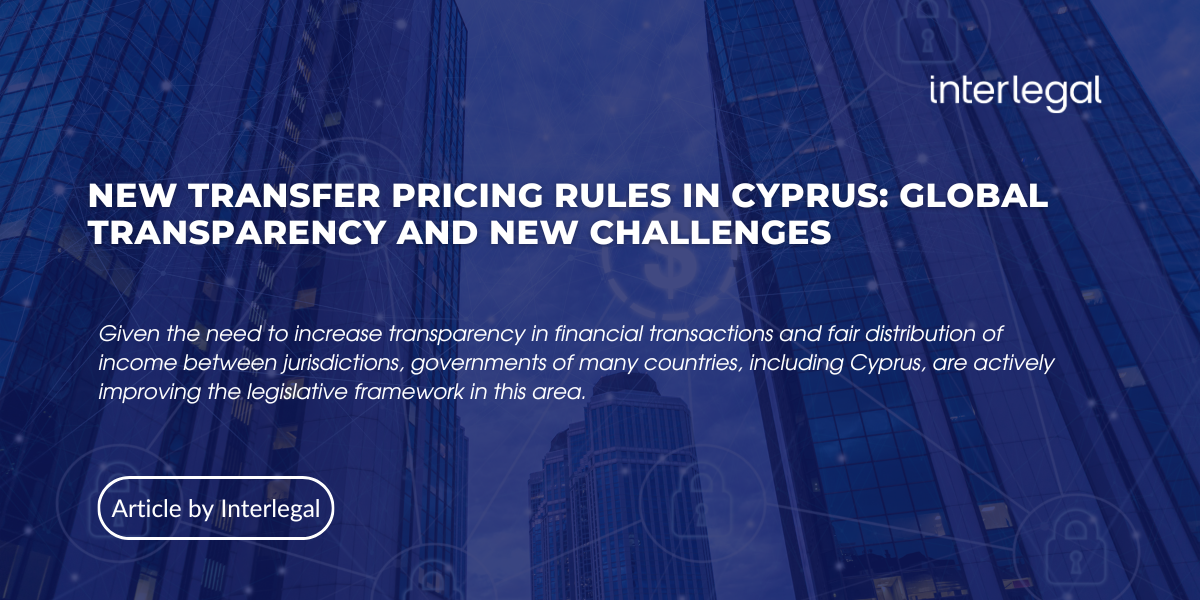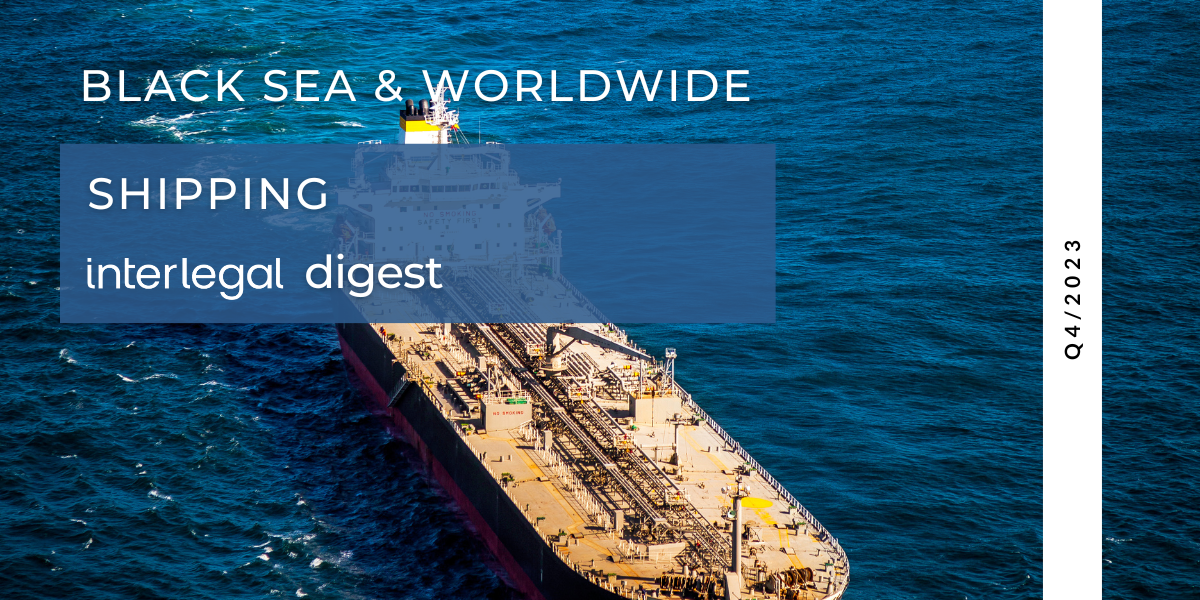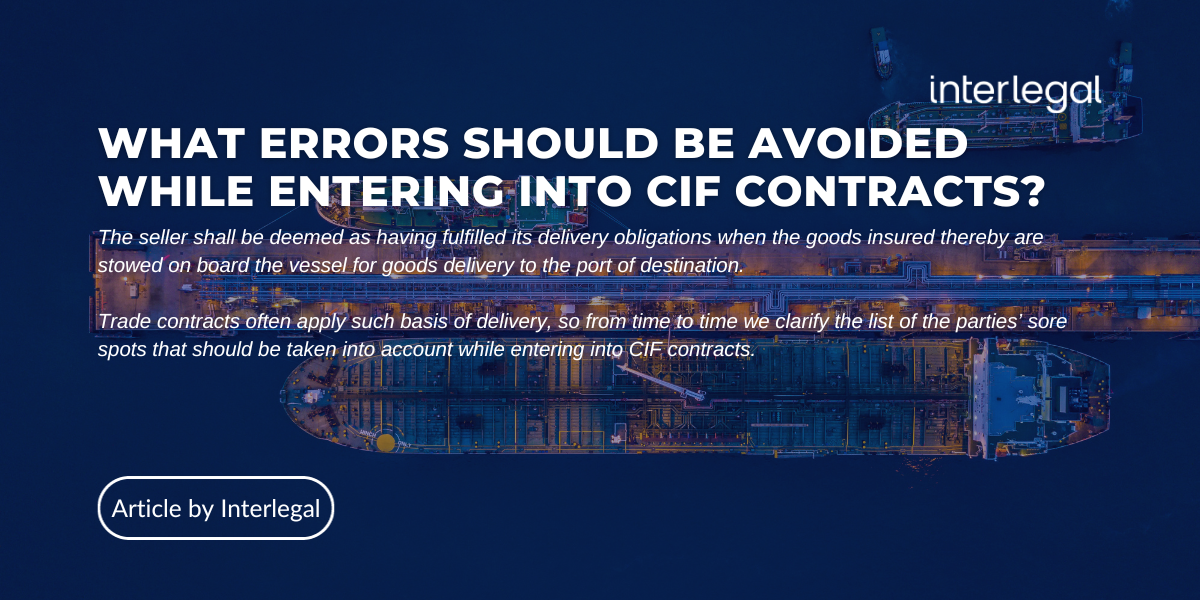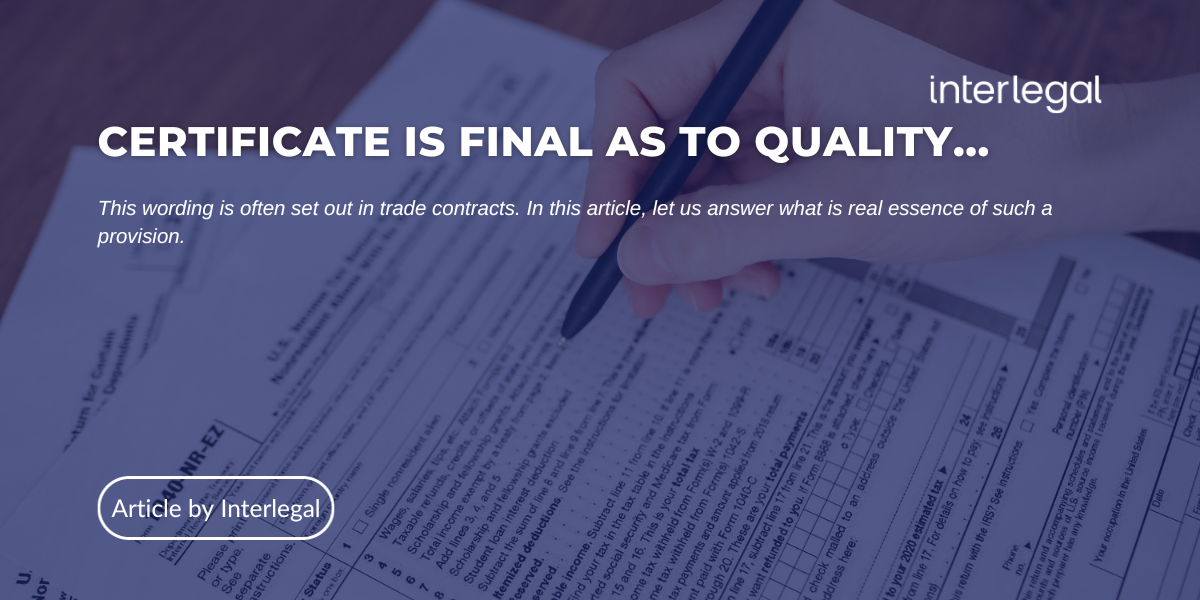Interlegal Shipping digest Q4 2023
8 January, 2024
5

Interlegal Shipping digest Q4 2023
Charting Uncharted Legal Seas: The Afra Oak Verdict and Its Implications for the Application of Hague Visby Article IV(2)(a) in Navigational Disputes
In the intricate tapestry of maritime law, where the ebb and flow of legal precedents shape the shores of judicial decision-making, the case of Mercuria Energy Trading Pte v. Raphael Cotoner Investments Ltd (The Afra Oak) [2023] EWHC 2978 (Comm) emerges as a pivotal landmark.
In the case, the court examined whether a shipowner can invoke Article IV(2)(a) of the Hague-Visby Rules as a defence when the master of a chartered vessel, contravening the charterer’s directives, incurs a loss to the charterer. This pivotal issue emerged in The Afra Oak case, with the facts being relatively straightforward.
On February 7, 2019, the charterers directed the vessel’s owners to navigate to Spore EOPL for further instructions. However, on February 9, the master chose to anchor in Indonesian territorial waters while awaiting further orders, believing it to be a more convenient anchorage. This decision led to the vessel’s detainment by the Indonesian Navy on February 12, 2019, and the subsequent arrest of the master. The anchoring was deemed a violation of the United Nations Convention on Law of the Sea (UNCLOS) 1982 and Indonesian law, resulting in a criminal conviction of the master in October 2019.
The charterer sought damages from the owner, alleging that the vessel was unseaworthy due to the master’s inadequate knowledge regarding anchoring in territorial waters, and that the master’s actions breached their employment instructions. The arbitration tribunal dismissed the unseaworthiness claim but agreed that the master had breached the employment instructions. However, the tribunal also determined that the owner was entitled to rely on Article IV(2)(a) of the Hague Rules, incorporated into the charterparty, which provides a defence for losses or damages arising from acts, neglect, or defaults of the master in navigation or ship management.
The charterer appealed, arguing that the tribunal erred in applying Article IV(2)(a) in this case. Their argument was based on the House of Lords decision in The Hill Harmony [2001] 1 AC 638, where the owner was not permitted to use the same defence after the master chose a different route than the one recommended by the charterer. However, Sir Nigel Teare distinguished the present case from The Hill Harmony, emphasizing that in The Afra Oak, the master’s failure to comply with the charterer’s order was due to poor navigation and seamanship, in contrast to the commercial decision in The Hill Harmony.
Sir Teare concluded that The Hill Harmony does not establish that the exception for a navigational fault is unavailable when there is a failure to follow an employment order. He noted that while in cases like The Hill Harmony, where the master’s decision is not due to navigation or seamanship error but rather a commercial choice, the defence under Article IV(2)(a) may not be applicable. However, in cases like The Afra Oak, where the decision is linked to poor navigation or seamanship, the defence might be valid. This judgment is significant for shipowners, especially when operating in regions with ambiguous territorial waters, as it suggests that navigational mistakes resulting in charterer loss could be defended under the Rules, provided they are successfully incorporated into the charterparty.
Mastering the Complexities of Damage Recovery in English Law: Tracing the Evolution from Hadley v Baxendale to The Sanix Ace in Commercial Dispute Jurisprudence
In the intricate tapestry of English law, the principle of damage recovery stands as a pillar of equitable justice, particularly in the sphere of commercial disputes. This principle, steeped in jurisprudential wisdom, is predicated on the notion that only substantial damages, those which represent a genuine pecuniary loss, are recoverable. It’s a doctrine that resonates with the pragmatic ethos of commerce, ensuring that the gears of trade and contractual engagements turn smoothly, unencumbered by frivolous or speculative claims.
At the heart of this doctrine lies the rule established in the landmark case of Hadley v Baxendale (1854). This case, a cornerstone in the edifice of English contract law, serves as a beacon, guiding the assessment of damages in contract disputes. The rule, eloquently articulated in this judicial pronouncement, bifurcates the recoverable damages into two distinct categories: those which arise naturally from the breach (i.e., direct or general damages) and those which, while not naturally arising, were reasonably contemplated by both parties at the time the contract was formed (i.e., indirect or consequential damages).
In dissecting the rule of Hadley v Baxendale, it becomes evident that the English legal system embraces a nuanced and calculated approach to damage recovery. The rule does not merely serve as a measure of loss; rather, it encapsulates a balanced assessment of foreseeability and causation. It demands that the damages claimed must not only be substantiated by a tangible loss but also must have been within the contemplative horizon of the contracting parties.
This judicious approach ensures that the ambit of recoverable damages is neither overly expansive nor unduly restrictive. It aligns with the commercial realities where parties seek a predictable and fair redressal mechanism for breaches of contract. The rule necessitates that parties, at the time of contracting, exercise foresight and delineate the potential scope of liability, thereby fostering a sense of responsibility and circumspection in commercial dealings.
Another Cornerstone of damages recovery in English law stands in compensatory damages recovery principle this principle is meticulously designed to restore the injured party to the position they would have occupied had the breach or tortious act not occurred. It is not aimed at punishment or unjust enrichment, but at equitable restitution.
Compensatory damages are intended to offer monetary reparation for loss or injury suffered due to another’s breach of duty or violation of rights. This concept is ingrained in the notion of fairness and justice, ensuring that the aggrieved party is duly compensated for actual losses or damages sustained.
It encapsulates both pecuniary (financial) losses such as loss of earnings or medical expenses, and, in certain cases, non-pecuniary losses like pain and suffering.
In contract law, compensatory damages are awarded to indemnify the party not in breach for the loss of bargain caused by the breach. The calculation of these damages is typically based on the expectation measure, which aims to put the claimant in the position they would have been in if the contract had been properly performed. This measure includes direct losses and, as established in Hadley v Baxendale, foreseeable indirect losses.
Additionally, explicating the aforementioned rule, it should be said that the claimant will only be able to recover the damages which he has himself suffered. However, this ostensibly straightforward principle is imbued with layers of complexity and nuances, particularly when one considers the dynamic and sometimes unpredictable nature of English law in recent jurisprudence.
Indeed, it is all not that simple. Recent cases, such as The Sanix Ace and Fehn Heaven, illustrate the evolving landscape of damage recovery in English law, where judicial decisions have occasionally deviated from the traditional trajectory. These cases highlight scenarios where the courts have grappled with intricate and unprecedented circumstances, leading to decisions that some might perceive as unpredictable or deviating from established principles.
In The Sanix Ace, for instance, the complexities involved in determining the actual loss suffered by the claimant, and how it aligns with the principle of the party bearing only their own losses, raised intriguing legal questions. Similarly, in Fehn Heaven, the court’s interpretation and application of established principles in a novel context further underscored the dynamic nature of legal reasoning in this sphere.
In the notable case of The Sanix Ace, the court explored the intricacies of damage recovery in charterparty agreements, shedding light on the rights of a charterer vis-?-vis the shipowner. Central to this discourse is the principle that where the charterer holds the property or an immediate right to possession of the goods, any loss to this proprietary or possessory interest due to the shipowner’s breach warrants compensation.
Crucially, in The Sanix Ace, it was elucidated that the charterer’s entitlement to recover full damages for the loss is unaffected by the risk-bearing status of the carriage. This implies that even if the goods were not being carried at the charterer’s risk, any diminution in their value due to damage entitles the charterer to full damages from the shipowner. The rationale behind this is straightforward yet profound: upon damage, the goods inherently lose value, resulting in an immediate loss to the charterer.
An intriguing aspect highlighted in this case is the irrelevance of the charterer’s means to mitigate pecuniary loss post-receipt of the damaged goods. Whether the charterer has subsequent contracts of sale or purchase that enable it to recoup the price from a buyer or receive reimbursement from a seller does not impede its right to full damages from the shipowner. This principle is rooted in the concept of res inter alios acta – a legal doctrine suggesting that these subsequent recoveries are transactions involving third parties and should not influence the assessment of damages against the shipowner The court further clarified that such recovery from third parties affects only “the ultimate destination of the damages” once recovered. This means that while the charterer would need to account for these recoveries to the third parties involved, it does not diminish their right to full damages from the shipowner. Moreover, unless special circumstances are notified, the right to recovery from a third party is too remote to impact the damages recovered from the shipowner.
In conclusion, the exploration of damage recovery principles in English law, as exemplified by cases like the Sanix Ace and Fehn Heaven, illuminates the sophisticated and nuanced approach the legal system adopts in addressing commercial disputes. The doctrine of compensatory damages, with its emphasis on restoring the injured party to their pre-loss position, and the intricate considerations involved in cases of charterparty agreements, highlight the delicate balance the law maintains between fairness and practicality. These cases not only reaffirm the fundamental tenets of contract and tort law but also underscore the dynamic nature of legal interpretation in the face of complex commercial realities. As English law continues to evolve, it reflects an enduring commitment to justly addressing the multifaceted aspects of damage recovery, ensuring that the principles of restitution and equity remain at the forefront of judicial decision-making in the realm of commercial disputes.
Shedding Light on the Shadows: IMO’s Landmark Resolution to Curb ‘Dark Fleet’ Operations and Uphold Maritime Integrity
The International Maritime Organization (IMO), in a momentous assembly, ratified a resolution that provides guidance to nations on thwarting the fraudulent and perilous maneuvers of an elusive fleet, often termed as “dark” or “shadow” ships, which are implicated in unlawful activities.
This resolution elicited objections from Iran and Russia, countries currently under the yoke of Western and US sanctions targeting their oil and shipping industries. These nations notably deploy “dark fleet” tankers for the transport of energy commodities.
Efforts to restrict the scope of the resolution, to encompass only those sanctions ratified by the United Nations General Assembly, as opposed to those imposed unilaterally by nations, were ultimately unsuccessful.
Originating from the IMO’s Legal Committee earlier in the year, amidst escalating concerns about hazardous practices by tankers, the resolution pays particular attention to the abundant ship-to-ship transfers of oil and petroleum products occurring in international waters, beyond the purview of port state control.
While ship-to-ship transfers are a standard procedure, the ones conducted for the evasion of sanctions in international waters are deficient in regulatory supervision and pose significant environmental threats.
The ratified resolution “strongly encourages” member states and all pertinent stakeholders to champion measures to obstruct illicit operations in the maritime sector by the ‘dark’ or ‘shadow’ fleet. This encapsulates, for the first time, a definition of what constitutes such a vessel.
The criteria include: conducting unsafe operations in violation of international regulations and best practices, deliberately evading inspections by flag and port states, failing to maintain adequate liability insurance, avoiding commercial screenings or inspections, lacking a transparent corporate governance policy ensuring crew and environmental welfare, and intentionally adopting measures to elude ship detection, such as deactivating vessel-tracking systems or obscuring identity.
Though the recommendations are not legally binding, they delineate a range of best practices pertinent to safety and environmental conventions. This encompasses the requirement for vessels to report all ship-to-ship transfers to their flag states and the introduction of intensified inspections at ports for ships suspected of disabling their tracking systems.
Both state governments and marine service providers, including insurers and shipowners, are implored to conduct workshops to elevate awareness regarding the “dark fleet,” best practices, and due diligence.
The legal committee is currently probing into the issue of fraudulent flag registries, the misuse of the IMO numbering system, and counterfeit recognised organisations linked to dark fleet operations.
The general assembly, convening biennially, is concluding its 10-day session in London on 06 of December.
Additionally, the IMO has passed another resolution denouncing Russia’s disruptive actions affecting navigation in the Black Sea, the Sea of Azov, and the Kerch Strait, including the unlawful appropriation of maritime and port infrastructure in Ukrainian territories under occupation.
This comprehensive resolution chronicles the ramifications of Russia’s annexation of Crimea since 2014 and its incursion into Ukraine since 2022 on the global maritime supply chains and shipping.
Bulk cargo deterioration: maritime claims and arrest specifications
Uncertainty is still ruling in the market of international freight transportation of Ukraine. The war caused market upheaval in the diesel fuel transportation sector, and currently it is brought to Ukraine mainly through the Danube river ports.
It will be appropriate to talk about case specifications related to deterioration of bulk cargoes, certainly, based on one of Interlegal cases.
Case circumstances are quite interesting: the client, although not Gaius Julius Caesar, played many roles in this transportation, acting both as the Charterer, the Cargo Owner, and the Ultimate Consignee (as per bill of lading).
The Client chartered a vessel to transport its cargo (ULSD, or Ultra Low Sulfur Diesel). In the process of discharge, water residues were detected in the pipeline and in the tanks.
General losses included the following: losses caused by cargo damage, losses caused by vehicle idle stay and losses resulted from surveys.
Interlegal law team quickly got involved in the case and developed the following action plan:
1. Detention of the vessel by the Harbor Master;
2. Vessel arrest;
3. Filing a claim to the Shipowner;
4.1. Entry into dispute settlement agreement
or
4.2. Filing a lawsuit to the court.
Until the last moment, it was not clear whether it would be possible to settle the dispute, or whether long-term court proceedings would be initiated for several years.
And this is directly related to the following specifications:
1. Technical specifications of vessels
A vessel carrying diesel fuel has two manifolds, i.e. two pipelines, one for loading fuel, the other for its discharge.
If the tank is airtight, there is minimum chance of damage to the cargo at the stage of loading and discharging operations and sea transportation.
2. Cargo chemical specifications
Water ingress is the most common form of damage to any cargo during sea transportation. Even in view of technical specifications of tankers, as we mentioned in the previous clause, such a situation is possible.
However, the density of water and the density of diesel fuel are different: later liquids get stratified. This phenomenon is more positive than negative, since the water can be pumped out and the cargo can be saved.
3. Direct transshipment
In the Danube river ports, there is no technical possibility to accumulate cargo; therefore, transshipment is carried out directly from vessel to trucks.
4. Number of counterparties
Although the Client was the Consignee as per bill of lading, in fact the cargo had already been sold to other counterparties. During case proceedings, it turned out that some counterparties have also already resold the cargo to other companies.
5. Rapid distribution throughout the territory of Ukraine
With regards to direct transshipment and trade scheme, the trucks are supplied by the Client’s counterparties, and after leaving the port territory, the cargo is delivered in various directions throughout Ukraine. In fact, the Consignee as per bill of lading loses any control over it.
6. Mixing with other goods
Counterparts reload cargo from motor vehicles into tanks of their bases. Usually, they already contain the product; therefore, the fuel gets mixed. It means impossibility of further determining the exact amount of damaged cargo and the amount of caused damage.
What happened in fact?
Position of the Cargo Owner:
– in case of water penetration into diesel fuel, indeed, if you conduct a quality analysis, quality will be reduced. It shows that at the stage of discharge, the Cargo Owner actually receives cargo that does not meet quality specifications;
– since the cargo has already been sold to other contractors, whose vehicles are being loaded, the Cargo Owner actually supplies to its contractors cargo that does not meet quality specifications;
– low-quality cargo immediately awakes a large number of claims from many counterparties to one Cargo Owner. Claims are related both to quality of the cargo and idle stay of trucks in the port;
– in order to mitigate losses, the cargo owner was forced to reduce the cargo cost and to reimburse all losses related to idle stay.
Position of the Shipowner:
– The Shipowner is aware of cargo chemical specifications and understands the possibility of further stratification. Therefore, the Shipowner is 100% sure that the amount of cargo damaged in the process of discharge and the amount of cargo damaged after discharge will be significantly different, namely towards decreasing the amount of damaged cargo;
– in order to accurately determine the volume of damaged cargo, the Shipowner requires a joint survey (which is absolutely impossible);
– ship arrest is completely legal, and each day of the vessel idle stay causes significant losses to the Shipowner;
Through long-term negotiations, the Parties nevertheless managed to reach a compromise and to enter into dispute settlement agreement. Having worked on such an interesting, albeit complex case, Interlegal singled out a rather simple, but effective list of recommendations for the Cargo Owner:
– To leave control over the cargo. In particular, to look for a place where the entire volume of cargo will be stored until the dispute is settled. All storage costs and fines from counterparties may be charged to the Shipowner in the future;
– Involvement of surveyors in the process of discharge in order to establish the fact, volume and cause of damage and understanding the need for a joint survey after discharge;
– Involvement of lawyers from the very beginning for the proper formation of the evidence base and taking security measures.
Interlegal Shipping digest Q4 2023


























































